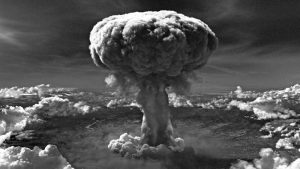What is Hiroshima Day?

Hiroshima Day is observed on 6th August every year.
The United States dropped an atomic bomb on the Japanese city of Hiroshima on 6th August 1945 during the course of the Second World War leading to the deaths of over 20,000 soldiers and about 70,000–126,000 civilians. A similar bomb was dropped on another Japanese city of Nagasaki three days later leading to a further 80000 deaths. This was the first and only instance of the usage of nuclear weapons in the world. Read more about this incident for the IAS exam.
Related links:
| Government Exams | UPSC Syllabus | NCERT Notes |
| Current Affairs | Government exams After 12th | Government Schemes |
Hiroshima Day – Series of Events
- The war in Europe had concluded after Germany surrendered on 8th May 1945. But the war in the Pacific continued between the Allies and Japan.
- The Allies asked for an unconditional surrender from Japan at the Potsdam Declaration in July 1945. This ultimatum was, however, ignored by Japan who continued waging the war.
- The US had been developing nuclear weaponry through the Manhattan Project since the 1940s, especially after receiving information that Nazi Germany was also involved in such research. By August, the project had developed two kinds of atomic bombs.
- The US army had created a separate unit in 1944 called the 509th Composite Group in order to operationalize the nuclear weapons usage in the war.
- After shortlisting five targets, the ‘Target Committee’ selected Hiroshima and Nagasaki because of their importance and industrial and military facilities.
- The orders for the atomic bombs to be used in Japanese cities were issued on July 25th.
- On 6th August, a B-29 (US army bomber) dropped the ‘Little Boy’ on Hiroshima. Little Boy was the codename for the atomic bomb dropped on Hiroshima which was a uranium gun-type bomb.
Impact of Bombing – Hiroshima Day
- Between 90000 and 146000 people died in Hiroshima. The city was immediately devastated after the bombing.
- For months after the bombing, people continued to die because of radiation sickness, burns and other wounds. Malnutrition and illness also compounded matters. Although most of the victims were civilians, some military personnel also were killed.
Other Similar Events (Cause & Impact)
- In Nagasaki, which was bombed on 9th August, about 80000 people were killed. The bomb dropped on this city was nicknamed ‘Fat Man’. It was a plutonium implosion-type bomb.
- On 15th August 1945, Japan surrendered to the Allies. The War officially ended on 2nd September when Japan signed the instrument of surrender.
- While many in the US defended its use of the atomic bombs arguing that it brought an end to the war which otherwise would have cost more lives, the legality and ethicality of the use of those weapons are still debated.
- Japan became a pacifist and non-nuclear country as a result of the horrendous effects of nuclear weapons.
- The effects of the radiation on the cities continued for decades with increased risks of cancer, birth defects and other anomalies in the survivors.
- In Japan, the survivors are called ‘Hibakusha’ (Japanese for ‘explosion-affected people’). There is about 650000 Hibakusha recognised by the government.
- Every year, August 6th is observed as ‘Hiroshima Day’ in memory of the victims.
- The use of atomic bombs by the US also led to the Soviet Union starting its nuclear weapons program. The Soviet Union detonated an atomic bomb in 1949. This was the beginning of the Cold War.
Also on this day
1862: The Madras High Court was inaugurated. 1925: Death of Surendranath Banerji, former president of the Indian National Congress.
See more This Day in History here
Also, See:
| Nuclear Arms Control |
| The Pillars Of India’s Nuclear Doctrine |

Comments